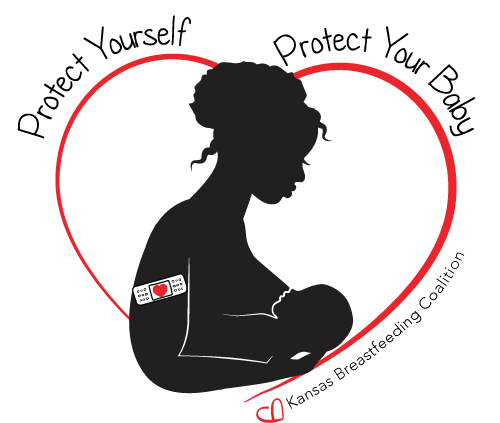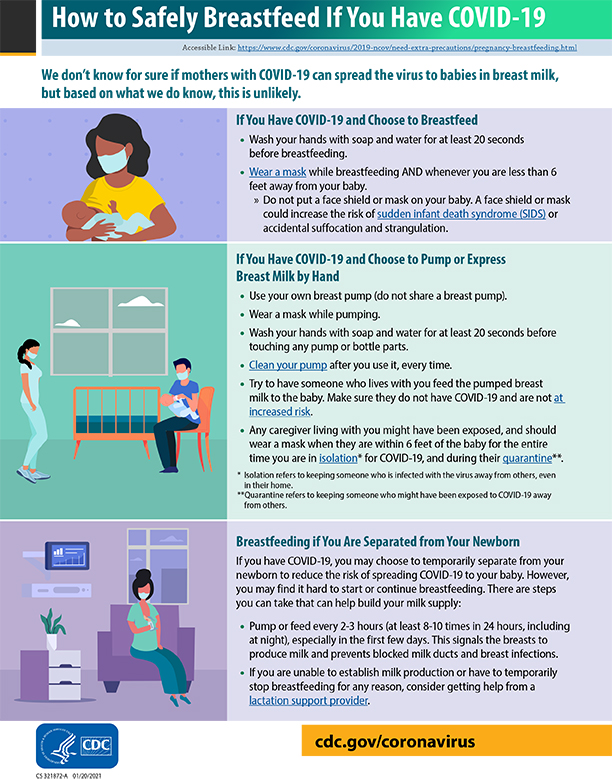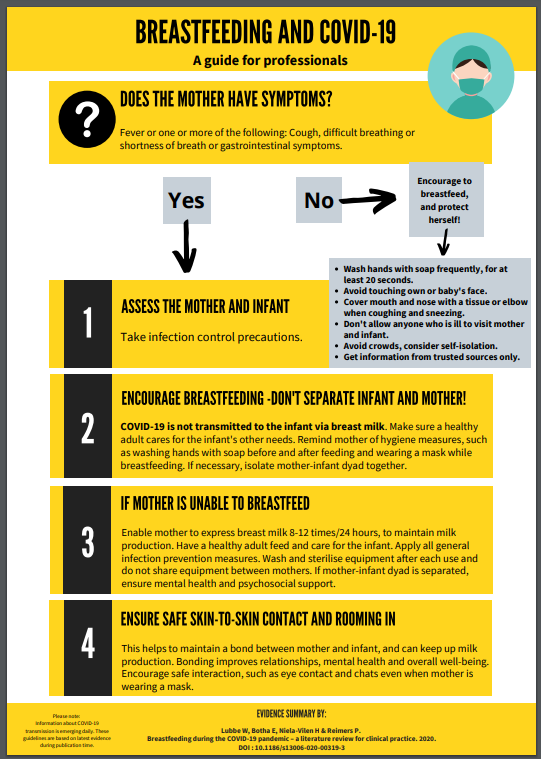COVID Vaccine & Breastfeeding:
“Based on research on women who chose to take the vaccine, we believe the risks that come with vaccination are low. The risk and benefit of the vaccine should be compared to each mother’s individual risk for getting COVID-19 as well as how well she is expected to tolerate the disease. Each mother and provider should discuss what choice fits their situation best.”
Infant Risk Center
None of the current COVID-19 vaccines have the live virus in them. This means there is no risk of you transmitting COVID-19 to your baby through your breast milk from the vaccine. In fact, the antibodies you get after vaccination may go through your breast milk and help to protect your baby.
Video – Protect Yourself, Protect Your Baby
Research & Resources:
- Maternal COVID vaccination and breastfeeding during a pandemic: Habitus and health behavior decision making: Public Health Nursing (June 2023)
- Safety and Efficacy of Coronavirus Disease 2019 (COVID-19) mRNA Vaccines During Lactation (March 2023)
- Comparing the SARS-CoV-2-specific antibody response in human milk after homologous and heterologous booster vaccinations
- Milk antibody response after 3rd dose of COVID-19 mRNA vaccine and SARS-CoV-2 breakthrough infection and implications for infant protection (BMJ, Dec. 2022)
- Detection of SARS-CoV-2 IgA and IgG in human milk and breastfeeding infant stool 6 months after maternal COVID-19 vaccination (JP, Jan. 2023)
- Increase in COVID Antibodies Following Booster Vaccinations (JHL, Nov. 2022)
- COVID-19 Drugs and Breastfeeding Update (ABM, Nov. 2022)
- Analysis of Vaccine Reactions After COVID-19 Vaccine Booster Doses Among Pregnant and Lactating Individuals (JAMA, Sept. 2022)
- Detection of Messenger RNA COVID-19 Vaccines in Human Breast Milk
- Antibodies Against COVID in Human Milk After Vaccination (ABM, June 2022)
- Comparing Human Milk Antibody Response After 4 Different Vaccines for COVID-19 (JAMA, March 2022)
- COVID-19 Vaccine in Pregnancy and Breastfeeding (Infant Risk Center)
- Mindful Discussion about the COVID-19 Vaccine (video by & for Black and Brown people) (Uzazi Village, Oct. 2021)
- Information about COVID-19 Vaccines for People who Are Pregnant or Breastfeeding (Centers for Disease Control)
- COVID-19 mRNA Vaccines (MotherToBaby, Oct. 2023)
- Vaccines, pregnancy, menstruation, lactation, and fertility (World Health Organization, video)
- Considerations for COVID-19 Vaccination in Lactation – Academy of Breastfeeding Medicine
- COVID-19 Vaccination and Pregnant and Lactating People – March of Dimes
- COVID-19 vaccine response in pregnant and lactating women, Study – American Journal of Obstetrics and Gynecology (AJOG)
- Leaders in Women’s Health Encourage Health Workers to Receive the COVID-19 Vaccine: Vaccination is the Key to Preventing New Infections. (ACOG, AWHONN, SMFM, ACNM, ASRM, NPWH, SOGH) \
- Maternal and Child Outcomes Reported by Breastfeeding Women Following Messenger RNA COVID-19 Vaccination (ABM, Sept. 2021)
- Society for Maternal-Fetal Medicine Statement: SARS-CoV-2 Vaccination in Pregnancy Addresses breastfeeding
- Get Your Recommended COVID-19 Vaccine During Pregnancy – American College of Obstetricians and Gynecologists
COVID & Breastfeeding
Women with COVID-19 can breastfeed if they wish to do so.
They should:
- Wash your hands with soap and water for at least 20 seconds before breastfeeding.
- Wear a mask while breastfeeding AND whenever you are less than 6 feet away from your baby
BREASTFEEDING HOTLINES:
- Michigan WIC: Call 833-MIWICBF or 833-649-4223. The phone line is staffed from 8 a.m. to 8 p.m. ET.
- Ohio: Call 888-588-3423. The hotline is available 24/7.
- Oklahoma: Call 877-271-MILK or text OK2BF to 61222. Urgent calls are returned 24/7, and texting is available from 8 a.m. to 8 p.m. ET.
To find local help with breastfeeding in Kansas, visit the Kansas Breastfeeding Coalition “Local Resources Directory”
For General Breastfeeding Resources for Parents, visit https://ksbreastfeeding.org/resources/general-resources-parents/
Workplace Assistance:
- Pumping at Work: Supporting Lactating Employees During Coronavirus (COVID-19)
- WorkLife Law Helpline to assist with workplace challenges related to breastfeeding during the pandemic.
- Fillable forms for requesting paid leave under the Families First Coronavirus Response Act – includes paid quarantine leave and childcare leave.
NEW studies on COVID-19 and maternal/infant separation after birth:
Neonatal management and outcomes during the COVID-19 pandemic: an observational cohort study – authors concluded that perinatal transmission of COVID-19 is unlikely to occur if correct hygiene precautions are undertaken and that allowing neonates to room in with their mothers and direct breastfeeding are safe procedures when paired with effective parental education of infant protective strategies.
Maternal transmission of SARS‐COV‐2 to the neonate, and possible routes for such transmission: a systematic review and critical analysis – authors concluded that neonatal COVID-19 infection is uncommon, rarely symptomatic, and the rate of infection is no greater when the baby is born vaginally, breastfed, or remains with the mother. They also stated that they found no evidence that isolating the baby from the mother is beneficial if hygiene precautions are taken, and encouraging the baby to spend time with its mother is likely to help with breastfeeding and bonding.
Resources, Guidance & Recommendations:
Resources for Lactation Support Providers: Webinars
COVID-19: Best Practices for Lactation Consultants & Perinatal Educators. (Order free recording), U.S. Lactation Consultant Association
COVID-19: Infant Feeding during the Postpartum Period (Webinar Recording), Dr. Aunchalee Palmquist
Going Home During a Pandemic: Challenges for Breastfeeding Families (May 13, 2020)
Lactation Education Resources has posted archived presentations on lactation support and COVID-19
Live Q&A session on COVID-19 with human milk lactation experts. The International Society for Research in Human Milk and Lactation (ISRHML)
Resources for Lactation Support Providers: Telehealth and Sample Policies
Telehealth Resources:
Telehealth Resources & Tips, Lactation Education Resources
Phone Triage Algorithm for Determining Home Visit or Telehealth Visit, Lactation Education Resources
IBLCE Advisory Opinion on Telehealth – The International Board of Lactation Consultant Examiners advisory addresses the provision of lactation consulting services via telehealth
Nurse Family Partnership: COVID-19 Telehealth Guidance
Seven Strategies for Conducting Services Virtually, NICHQ
Sample Policies:
COVID-19 & Breast Milk Expression and Breast Milk Feeding for PUIs *sample policy (3/31/20)
Handling of breast milk from COVID-19 mothers *sample policy (3/31/20)
Sample Informed Consent Form for Refusal to Separate Birthing Parent and Infant
Resources for Lactation Support Providers: General
Academy of Breastfeeding Medicine
ABM Statement On Coronavirus 2019 (COVID-19)
Should Infants Be Separated from Mothers with COVID-19? First, Do No Harm
Breastfeeding and Respiratory Antivirals: Coronavirus and Influenza
American Academy of Family Physicians
AAFP Statement on Breastfeeding and COVID-19
The American Journal of Maternal/Child Nursing
Pregnant Women's Reports of the Impact of COVID-19 on Pregnancy, Prenatal Care, and Infant Feeding Plans. The article includes descriptions of how the COVID-19 pandemic has affected pregnancy, prenatal maternity care practices, and infant feeding plans among pregnant women in the United States. The authors emphasize the need for healthcare providers and policymakers to listen to the collective voices of women about how COVID-19 has affected their birth and infant feeding plans, and their perceptions of changes in prenatal care.
Carolina Global Breastfeeding Institute
COVID-19 Handling Expressed Human Milk (pdf)
Centers for Disease Control and Prevention (CDC)
Human Milk Banking Association of North America
Milk Handling for COVID-19 Positive or Suspected Mothers in the Hospital Setting
Why Donor Human Milk is an Essential Need During COVID-19
International Board of Lactation Consultant Examiners:
IBLCE Advisory Opinion on Telehealth
The International Lactation Consultant Association
Resources for Skilled Lactation Providers on COVID-19
Providing Lactation Support During the COVID-19 Pandemic: Q&A With Annie Frisbie, Practicing in New York, US (ILCA Blog)
Journal of Human Lactation
Lactation Education Resources
Resources for Lactation Supporters During COVID-19
Maternal & Child Nutrition
Experiences of breastfeeding during COVID‐19: Lessons for future practical and emotional support. The authors conducted an online survey of breastfeeding mothers about the effects of the COVID-19 lockdown on breastfeeding experiences in the UK. The authors found that some mothers felt that breastfeeding was protected due to lockdown, while others struggled to get breastfeeding support.
The National WIC Association
Breastfeeding and COVID-19 Guidance
UNICEF
U.S. Agency for International Development
Infant and Young Child Feeding Recommendations When COVID-19 is Suspected or Confirmed - 10 Counselling Cards and a Recommended Practices Booklet, reflect the global recommendations from WHO and UNICEF (March 2020) on IYCF in the context of COVID-19
United States Breastfeeding Committee
COVID-19 and Breastfeeding Guide for Parents.
Statement on Pasteurized Donor Human Milk & COVID-19
U.S. Agency for International Development (USAID)
Key Messages Related to Evidence on Transmission of COVID in Breastmilk. USAID The brief includes key messages on research related to COVID-19 transmission through human breast milk.
World Health Organization
Breastfeeding advice during the COVID-19 outbreak (infographics)
FAQs Breastfeeding and COVID-19 For health care workers (pdf)
Q&A on COVID-19 and breastfeeding
Other
General Information on Coronavirus, Pregnancy and Childbirth
Sample Informed Consent Form for Refusal to Separate Birthing Parent and Infant
American Academy of Pediatrics
AAP Perinatal COVID-19 Registry
FAQs: Management of Infants Born to Mothers with Suspected or Confirmed COVID-19 (updated 7/22/2020)
Baby-Friendly USA
Centers for Disease Control and Prevention (CDC)
Harvard Medical School
COVID-19: Separating Infected Mothers from Newborns: Weighing the Risks and Benefits
Journal of the American Medical Association: Pediatrics
Outcomes of Neonates Born to Mothers With Severe Acute Respiratory Syndrome Coronavirus 2 Infection at a Large Medical Center in New York City. The article concludes that during the COVID-19 pandemic, separation of affected mothers and newborns may not be warranted, and direct breastfeeding appears to be safe.
Kansas Department of Health and Environment (KDHE)
FAQ COVID-19 for Pregnant Women and Infants (English)
FAQ COVID-19 for Pregnant Women and Infants (Spanish)
UNICEF
Coronavirus disease (COVID-19): What parents should know
U.S. Agency for International Development
Infant and Young Child Feeding Recommendations When COVID-19 is Suspected or Confirmed - 10 Counselling Cards and a Recommended Practices Booklet, reflect the global recommendations from WHO and UNICEF (March 2020) on IYCF in the context of COVID-19
U.S. Department of Agriculture, Food and Nutrition Service
FNS Program Guidance on Human Pandemic Response
World Health Organization
Breastfeeding advice during the COVID-19 outbreak (infographics)
Resources for Maternity Care Providers
The American College of Obstetricians and Gynecologists
COVID-19 FAQs for Obstetrician-Gynecologists, Obstetrics
The American College of Obstetricians and Gynecologists and Society for Maternal-Fetal Medicine
Centers for Disease Control and Prevention (CDC)
Sample Informed Consent Form for Refusal to Separate Birthing Parent and Infant
National Perinatal Association and the National Association of Neonatal Nurses
World Health Organization
Breastfeeding advice during the COVID-19 outbreak (infographics)
Research Studies
Breastfeeding during the COVID-19 pandemic – a literature review for clinical practice
Breastfeeding mothers with COVID-19 infection: a case series
Mistakes from the HIV pandemic should inform the COVID-19 response for maternal and newborn care
Lackey KA, Pace RM, Williams JE, Bode L, Donovan SM, Järvinen KM, Seppo A, Raiten DJ, Meehan CL, McGuire MA, McGuire MK. SARS-CoV-2 and human milk: what is the evidence? doi: https://doi.org/10.1101/2020.04.07.20056812 [doi.org] [preprint prior to peer review]
Kimberlin DW, Puopolo KM. Breastmilk and COVID-19: What Do We Know? [Published online ahead of print, 2020 Jun 21]. Clin Infect Dis. 2020;ciaa800. doi:10.1093/cid/ciaa800 https://www.ncbi.nlm.nih.gov/pmc/articles/PMC7337725/ [ncbi.nlm.nih.gov]
Salvatore CM, Han J-Y, Acker KP, Tiwari P, Jin J, Brandler M, Cangemi C, Gordon L, Parow A, DiPace J, DeLaMora P. (2020). Neonatal management and outcomes during the COVID-19 pandemic: An observation cohort study. Lancet Child Adolesc Health. https://www.thelancet.com/journals/lanchi/article/PIIS2352-4642(20)30235-2/fulltext [thelancet.com]



